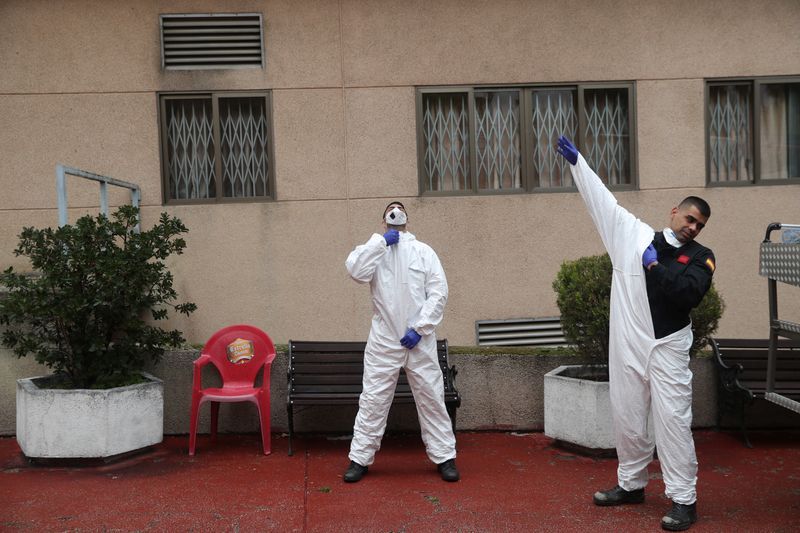Hardline judge Raisi wins Iran’s presidential election
 Raisi, a protégé of the Supreme Leader, was widely seen as the frontrunner in Friday’s election [Majid Asgaripour/WANA via Reuters]
Raisi, a protégé of the Supreme Leader, was widely seen as the frontrunner in Friday’s election [Majid Asgaripour/WANA via Reuters]Hardline judge Ebrahim Raisi was heading for a landslide win in Iran’s presidential election on Saturday, as the man he will replace pledged a smooth transition a day after millions voted in a contest that critics boycotted over economic woes and political curbs.
With some 90% of the 28.6 million ballots cast in a turnout of 48% already counted, Raisi’s tally was 17.8 million, interior ministry official Jamal Orfi told a televised news conference, giving him an unassailable lead.
Raisi, a 60-year-old Shi’ite cleric who is subject to U.S. sanctions for alleged human rights abuses, had been widely tipped to win the contest, thanks to the endorsement of Supreme Leader Ayatollah Ali Khamenei.
Outgoing President Hassan Rouhani visited Raisi at his office to congratulate him, and Foreign Minister Mohammad Javad Zarif said he would lead Iran well.
“We will stand by and cooperate fully with the president-elect for the next 45 days, when the new government takes charge,” Rouhani was quoted as saying by state media.
Raisi’s election comes at a critical time.
Iran and six major powers are in talks to revive their 2015 nuclear deal. Then U.S. President Donald Trump abandoned the deal in 2018 and reimposed crippling sanctions that have squeezed Iran’s oil income.
Raisi offered no detailed political or economic programme during his election campaign, but has backed the revival of the nuclear pact, a development that would bring an easing of U.S. sanctions that have crushed the economy.
“We will make every effort in the new government to solve the problem of people’s livelihoods.” he was quoted as saying by state media.
Khamenei, not the president, has the last say on all issue of state such as Iran’s foreign and nuclear policies.
Appointed by the Supreme Leader to the high-profile job of judiciary chief in 2019, Raisi was placed under U.S. sanctions a few months later over human rights violations including the executions of thousands of political prisoners in the 1980s and the violent suppression of unrest in 2009, events in which he played a part according to human rights groups.
Iran has never acknowledged the mass executions, and Raisi himself has never publicly addressed allegations about his role.
Raisi’s sole moderate rival in Friday four-man election, former central bank chief Abdolnasser Hemmati, was on 2.4 million votes, behind former Revolutionary Guards commander Mohsen Rezaei who was in second place on 3.3 million, Orfi said.
Khamenei, not the president, has the last say on all state matters like foreign and nuclear policies.
LACK OF CHOICE
Hoping to boost their legitimacy, the country’s clerical rulers had urged people to turn out and vote on Friday, but dissidents inside and abroad said popular anger over economic hardship and curbs on freedoms kept many Iranians at home.
Activists fear Raisi’s presidency could usher in more repression.
With some 28.6 million Iranians out of 59 million eligible voters participating in the election, the 48% turnout was slightly over what was expected by analysts.
Khamenei said that figure demonstrated public support for Iran’s establishment.
Another deterrent for many pro-reform voters was a lack of choice, after a hardline election body barred heavyweight moderates and conservatives from standing.
Analysts said the exclusions by the Guardian Council cleared the way for Raisi’s expected victory.
A U.S. State Department spokesperson said on Friday: “Iranians were denied their right to choose their own leaders in a free and fair electoral process” – a likely reference to the disqualification of candidates.
Analysts say the election win could increase Raisi’s chances of succeeding Khamenei, who himself served two terms as president before becoming supreme leader upon founder of the Islamic Revolution Ayatollah Ruhollah Khomeini’s 1989 death.
SOURCE: REUTERS











